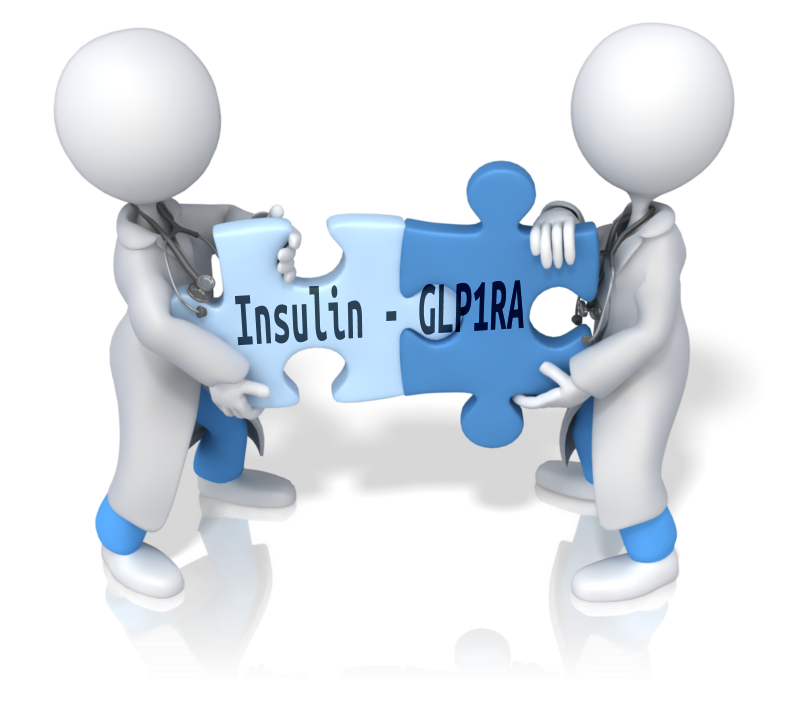27th January 2024, A/Prof Chee L Khoo

We are all pretty much used to weekly GLP1-RA injections for our patients with type 2 diabetes (T2D). Certainly, a lot less needles compared with the once daily or twice daily GLP1-RA injections and therefore more acceptable to patients (including those without diabetes!). Weekly GLP-1 are efficacious in reducing fasting as well as postprandial glucose. We explored the weekly insulin, icodec 6 months ago when we looked at the ONWARDS-2 trial which demonstrated that icodec weekly was as good as once daily insulin, degludec, if not better. It would make sense then if we could combine both agents in the one injection since they are both weekly injections. But are they any good?
Insulin icodec (icodec) is a once-weekly basal insulin discovered by systematic re-engineering of an ultra-long oral insulin, OI338 by reducing albumin binding and reducing the insulin receptor affinity thereby reducing insulin clearance and increasing half-life to 70 hours.
ONWARDS series
ONWARDS is a phase 3a clinical trial program that comprises 6 trials investigating the efficacy and safety of icodec in various clinical scenarios.7 In the ONWARDS 4 and ONWARDS 2 trials, among participants with insulin-treated type 2 diabetes, haemoglobin A1c (HbA1c) reductions were similar or better with icodec than once-daily insulin glargine U100 or insulin degludec, with no statistically significant differences in level 2 or 3 hypoglycaemia rates.8,9
In the ONWARDS 3 trial, icodec demonstrated superior HbA1c reduction to once-daily degludec after 26 weeks of treatment, with no difference in weight change and a higher rate of combined level 2 or 3 hypoglycemic events in the context of less than 1 event per patient-year exposure in both groups.
In the ONWARDS 1 trial, glycaemic control was significantly better with once-weekly insulin icodec than with once-daily insulin glargine U100.
In the ONWARDS 5 trial, compared with once daily basal insulins (degludec, glargine U100 or glargine U300), icodec with dosing guide app showed superior HbA1c reduction and improved treatment satisfaction and compliance with similarly low hypoglycaemia rates.
In the ONWARDS 6 trial,in adults with type 1 diabetes, once-weekly icodec showed non-inferiority to once-daily degludec in HbA1c reduction at week 26, but with statistically significantly higher rates of combined clinically significant or severe hypoglycaemia.
Thus, we know that icodec is as good as any of the basal insulins in T2D in reducing HbA1c but an increased rate of hypoglycaemia in some of the ONWARD trials.
COMBINE series
COMBINE is a Phase 3a clinical trial program comparing IcoSema (icodec + semagludite) in various clinical scenarios. COMBINE 1, a 52-week trial comparing once-weekly IcoSema with insulin icodec in about 1300 patients, and COMBINE 2, comparing IcoSema with semaglutide in about 700 patients, will be announced later this year. COMBINE 3 compared IcoSema with glargine U100 + prandial insulin aspart at meal times. COMBINE 3 has just released its data.
COMBINE-3 Clinical trial
This is a Phase 3a, 52-week open-label randomised clinical trial comparing once-weekly injected IcoSema to separate injections of once-daily insulin glargine U100 and insulin aspart taken at mealtimes. 679 people with T2D whose A1c levels were above target (average 8.3%) on daily basal insulin. Some were also taking oral glucose-lowering medications.
At 52 weeks, A1c percentage point reductions were 1.47 with IcoSema compared with 1.40 with daily glargine and aspart, thereby achieving the primary noninferiority endpoint. From an overall baseline body weight of 85.8 kg, those taking IcoSema experienced a 3.6 kg weight loss at 52 weeks compared to a gain of 3.2 kg with the two insulins.
Rates of clinically significant hypoglycaemia, defined as events below 3.0 mmol/L (54 mg/dL) per patient-year of exposure, were 0.26 with once-weekly IcoSema vs 2.18 for daily glargine + aspart. Gastrointestinal adverse events were consistent with those of the glucagon-like peptide 1 agonist class and were mostly mild to moderate, the company reported.
Novo Nordisk’s fixed-ratio once-weekly combined basal insulin icodec and semaglutide product (IcoSema) was noninferior in A1c-lowering to daily injected glargine U100 plus aspart insulins in people with T2D. But just imagine the reduction in the number injections per week. 7 injections vs 15-20 injections with the basal bolus regimen. Combining a weekly insulin with a weekly GLP1-RA is an ideal combination.
Reference:
https://www.medscape.com/viewarticle/combined-icodec-semaglutide-looks-good-compared-insulin-2024a10000n9?ecd=WNL_mdpls_240112_mscpedit_diab_etid6236694&uac=90421HR&spon=22&impID=6236694. Accessed 25th January 2024
